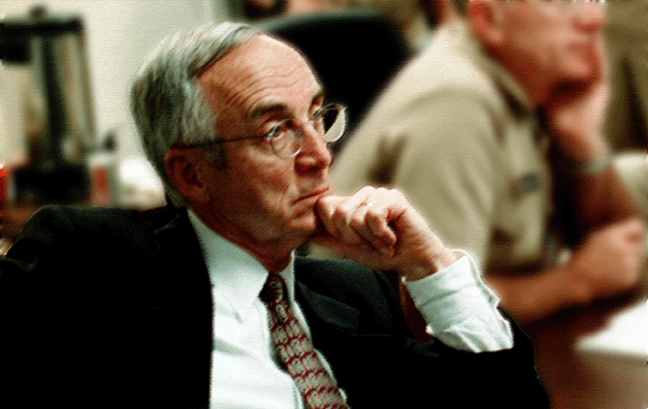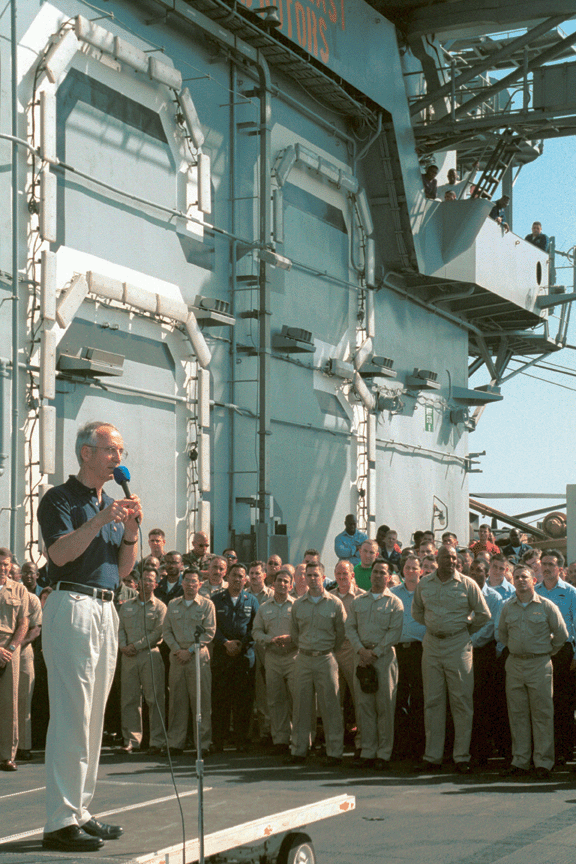Never forget
As Gordon England ’75 MBA begins his second term as secretary of the Navy, his focus is never far from Sept. 11, 2001.
Never forget
As Gordon England ’75 MBA begins his second term as secretary of the Navy, his focus is never far from Sept. 11, 2001.
From a speech that Secretary of the Navy England gave at the Navy Ball in Houston in October.
I am delighted to be here this evening to celebrate 228 years of Navy excellence … and service to this country. It’s especially terrific to do my celebrating here with each of you in the great state of Texas … or, as our commander-in-chief would say, “back home.”
 It is a dangerous time, and once again, it is our military — Navy, Marine Corps, Army, Air Force and Coast Guard — who have boldly volunteered to protect each of us and our very way of life. A student of history once described a group of American freedom fighters this way. He said: “Hundreds of soldiers had abandoned their homes to achieve everlasting freedom for their children. They were fighting for all that makes life worth living or gives value to its possession.”
It is a dangerous time, and once again, it is our military — Navy, Marine Corps, Army, Air Force and Coast Guard — who have boldly volunteered to protect each of us and our very way of life. A student of history once described a group of American freedom fighters this way. He said: “Hundreds of soldiers had abandoned their homes to achieve everlasting freedom for their children. They were fighting for all that makes life worth living or gives value to its possession.”
Those words could have been written about any soldier or sailor serving in Afghanistan or Iraq or Liberia or a hundred other places around the world today. But these words were written 167 years ago, in a place not far from here, about a group of brave Texans fighting in the Battle of San Jacinto.
Those Texas patriots understood one very important truth: Freedom is worth fighting for. For more than two centuries, that conviction has been one of the foundations of our country and of this Navy we love.
Teddy Roosevelt used to call this phenomenon “Americanization.” What he was talking about was that special brand of patriotism that inspires a farmer or teacher, a mechanic or doctor, an 18-year-old kid or middle-aged parent to go off to war when our liberties and freedoms are threatened.
Today, we live and work in a far more threatening frontier of warfare than ever before. For the first time in the history of the world, a small number of people, without a country and without vast resources, can wreak untold havoc against our cities, against our allies and against freedom-loving people around the world.
Centuries ago, battles were fought under strict rules of engagement, and the method of warfare was quite unsophisticated. Then during the Civil War, technology made a giant leap. Improved rifles and cannon brought a horrifying increase in the number of casualties that could be inflicted.
Technology made a second leap in World War I as tanks and machine guns were added to the mix. By World War II, airplanes, rockets, artillery, submarines — and, yes, weapons of mass destruction — made war much more global with the potential to destroy entire cities — countries, even.
 Still, for the most part, adversaries on the field of battle played by a similar rule book that acknowledged certain restraints. Some of these restraints were even codified in international law. All of that changed Sept. 11, 2001. On that day, we found that the enemy we faced was like no other in the history of this nation, or the world.
Still, for the most part, adversaries on the field of battle played by a similar rule book that acknowledged certain restraints. Some of these restraints were even codified in international law. All of that changed Sept. 11, 2001. On that day, we found that the enemy we faced was like no other in the history of this nation, or the world.
As President Bush told a group of New Hampshire National Guardsmen last week, “The terrorists target the innocent. These committed killers will not be stopped by negotiations; they won’t respond to reason.” While terrorists target the innocent, our nation takes great pains to limit damage and to avoid injuring noncombatants.
The president continued, “The terrorists who threaten America cannot be appeased — they must be found, they must be fought, and they must be defeated.”
And that is exactly what we’re doing — at the Department of Homeland Security where I just finished helping Secretary Ridge establish the new Cabinet-level department, to the decks of the USS Enterprise and USS Peleliu in the waters today near the Persian Gulf — we are fighting around the world, around the clock, on sea and on land, seeking out the terrorists wherever they may hide.
The U.S. Navy has always been a global force. John Paul Jones took the fight to the coast of Britain during the Revolutionary War. Commodore Preble led a squadron to the Mediterranean a few years later to quell pirates — the terrorists of that time.
In World War II, our Navy sought out the enemy in the Atlantic and Pacific. Throughout the Cold War, naval forces maintained a forward presence that kept the expansion of communism in check. This heritage continues today.
Our Navy has progressed from sail to steam, from cannonballs to cruise missiles, from battleships to carriers, from signal flags to information technology. In so doing, we have extended the reach and influence of the United States Navy from the high seas to the far corners of Earth. But one enduring quality has not changed — our people.
For the past 228 years, the strength of our Navy is our people and our leadership. People and leadership have been, are and always will be the backbone and enduring strength of our Navy and our great nation.
While victory was swift in Operation Enduring Freedom and Operation Iraqi Freedom, this is not THE war. These were great victories and important battles — a crucial phase in the war against terrorism. But these battles are more like Korea.
Korea was a terrible, bloody battle of a much longer war against communism — a war that lasted until the Berlin Wall came down in 1989 almost 40 years later. Like Korea, Afghanistan and Iraq are unfortunately likely closer to the beginning of the war against terrorism than the end.
You have heard many stories of heroism on 9-11, but let me tell you another story of courage on 9-11 … but this 9-11 was in 1776.
The fledgling United States had declared independence just two months earlier. Our courageous founding fathers knew they must hang together or they would certainly hang separately.
The British Army had routed our army and occupied Manhattan Island. Lord Howe, commander of the king’s forces, called for a meeting with American officials to offer a truce — a truce with one small catch: The Americans had only to surrender their quest for freedom.
John Adams, Ben Franklin and Edward Rutledge traveled from Pennsylvania to meet with Lord Howe in New York. Surrounded by hundreds of Royal Navy ships and thousands of British soldiers, these patriots did not falter. They stood tall for freedom and liberty. They refused Lord Howe’s terms. They knew that this cause of freedom was the foundation for a new nation and a beacon for the world. America was determined, and we struggled, we won and we flourished. We became a symbol of hope for people everywhere.
Two centuries later others came to attack New York, the Pentagon and what has become a hallowed field in Pennsylvania. These terrorists also thought they could intimidate America and force us to give up our quest for liberty for all people around the world. They failed. Like our forefathers, we will not be intimidated, and we will stamp out terrorism — for our children, grandchildren and their families.
America has been a symbol of hope for the world from our founding. We still are today.
America doesn’t fight for land. We don’t fight for money; and we won’t fight simply to impose our will.
But we do take up arms to secure this country and defeat evil when it threatens our lives and our liberty. We do fight for freedom, and we will finish the job once started.
So tonight, as we come together, military and civilians alike, to celebrate the heritage and core values that for 228 years have been the foundation of the United States Navy, I leave you with two words. Never forget.
Never forget the horrific events of 9-11.
Never forget that our nation depends on our men and women in uniform to preserve liberty and freedom throughout the world.
Never forget that for 228 years our Navy has carried the torch of freedom around the world, and that tradition continues today.
God bless each of you who serve our nation. I am proud to serve with you. Happy birthday, shipmates!
Thank you very much, and God bless America.
Gordon England was first appointed secretary of the Navy in May 2001. In January 2003, he was asked to serve as deputy secretary in the newly established Department of Homeland Security. In October this year, he returned to his position as naval secretary following the unexpected death of Colin McMillan. England is a longtime Fort Worth businessman and community leader who was president of General Dynamics, later Lockheed Aircraft Co., and later executive vice president at General Dynamics.

Your comments are welcome
Comments
Related Reading:
Alumni
Volunteering at Camp Fire First Texas Leads Brian Miller to a Lifelong Passion for Helping Children Heal
As president and CEO of the nonprofit, Brian Miller combines his passion for mental health and the outdoors to help children grow and thrive.
Alumni
Julie Rootes Interiors: Successful By Design
From Texas roots to global recognition, the TCU alumna brings fresh perspectives to luxury interiors.